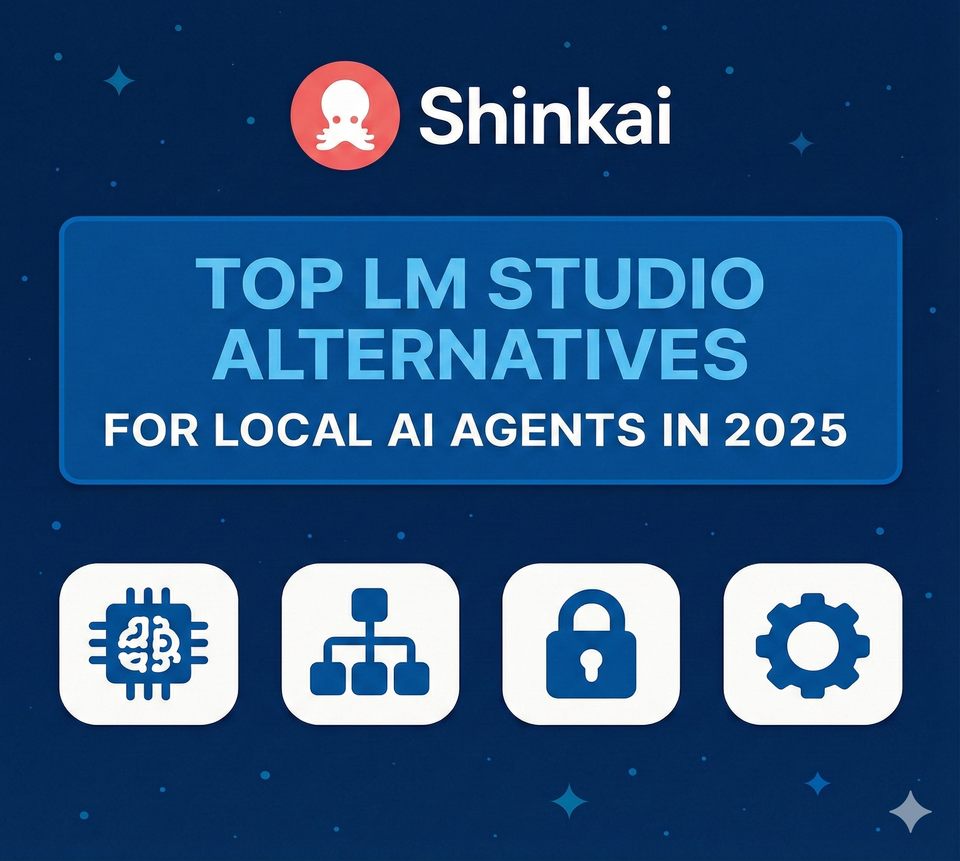Top LM Studio Alternatives for Local AI Agents in 2025 (Complete Guide)

Local AI is no longer a niche. In 2025, running large language models directly on personal hardware has become a serious movement driven by privacy concerns, performance needs, offline access, and full data ownership.
LM Studio has been one of the most popular tools in this space, allowing users to run open-source models locally with a friendly interface. But it is far from the only option — and depending on your workflow, it may not even be the best one.
This guide explores the top LM Studio alternatives for local AI agents in 2025, comparing tools based on usability, agent workflows, extensibility, privacy, and automation.
What Is LM Studio? (Quick Context)
LM Studio is a desktop application that lets users download and run local LLMs (such as LLaMA, Mistral, and Mixtral) on their own machines. It focuses on:
- Easy model downloading
- Local inference
- Simple chat interface
- No cloud dependency
It’s an excellent on-ramp to local AI. However, as users move from simple chatting to building full AI agents, many start to look for more advanced alternatives. LM Studio is primarily optimized for local chat-based interaction, rather than full agent orchestration or automated workflows.
What to Look for in an LM Studio Alternative
When evaluating alternatives in 2025, power users typically care about:
- True local execution
- Agent creation & orchestration
- Multi-model support
- Tool and API integrations
- Automation & scheduled workflows
- Privacy and data control
- Extensibility for developers
- UI vs. API-first workflows
- Multimodal support (text, images, files, tools)
1. Ollama (Best Lightweight CLI-First Alternative)
Best for: Developers who prefer terminal workflows and scripting.
Ollama is one of the most widely adopted local model runtimes. It allows you to spin up LLMs with a single command and integrate them directly into applications.
Key strengths:
- Extremely lightweight
- Simple CLI interface
- Excellent for backend services
- Strong open-source community
- Native support for popular open models
Limitations:
- No native visual agent builder
- Requires technical setup
- Very limited UI for non-developers
Ollama is the closest engine-level runtime alternative to LM Studio.
2. GPT4All (Desktop Local AI Assistant)
Best for: Users who want a simple desktop alternative to LM Studio with strong offline support.
GPT4All is a desktop application that allows users to run open-source LLMs entirely on their local machine, with an emphasis on privacy and offline usage. Unlike web interfaces or frameworks, it ships as a ready-to-use app for Windows, macOS, and Linux.
Key strengths:
- Fully offline local inference
- Simple desktop UI
- Wide support for open-source models (LLaMA, Mistral, etc.)
- No cloud dependency
- Active open-source ecosystem
Limitations:
- Focused on chat, not full agents
- Limited automation and tool orchestration
- No native multi-agent workflows
- No built-in tool execution or external integrations
GPT4All is often considered the most direct consumer-friendly alternative to LM Studio, especially for users who want a plug-and-play local chat experience.
3. Shinkai App (Agent-Focused Local AI OS)
Best for: Users who want to go beyond chat and build real AI agents locally.
Shinkai takes a different approach from LM Studio. Instead of focusing only on local chat, it’s designed as a local AI operating system where users can:
- Build modular AI agents
- Run local models via Ollama and other runtimes
- Connect tools, files, and APIs
- Automate workflows with scheduled tasks
- Maintain strong privacy controls
Key strengths:
- True agent-based architecture
- Multi-model support (OpenAI, Anthropic, Ollama, and open-source runtimes)
- Tool-calling and workflow automation
- File & data integrations
- Local-first privacy design
Limitations:
- More complex than basic chat apps
- Designed for builders rather than casual users
Shinkai is not a “drop-in replacement” for LM Studio — it targets users who want to build and automate AI workflows, not just talk to a model.
4. Jan.ai (Privacy-First Local Desktop Assistant)
Best for: Users who want a simple, privacy-focused local chat experience with a modern desktop interface.
Jan.ai is an open-source desktop application designed to run AI models directly on your local machine, with a strong emphasis on privacy and offline usage. Unlike cloud-based assistants, Jan.ai allows users to keep conversations and data on-device while working with open-source models.
It positions itself as a privacy-friendly alternative to ChatGPT and LM Studio, especially for users who prioritize local execution over automation and agent systems.
Key strengths:
- Clean and modern desktop UI
- Local model execution (on-device)
- Strong focus on privacy and user control
- Open-source
- Easy onboarding for non-technical users
Limitations:
- Limited support for multi-step agents
- Minimal automation features
- Mostly centered on one-to-one chat
- No native workflow orchestration
Jan.ai is ideal for users who want a private local AI chat assistant for everyday use, but it is not designed for complex agent workflows or automated systems.
5. LocalAI (Backend-First Open-Source Engine)
Best for: Teams building production-grade local AI infrastructure.
LocalAI is an open-source drop-in replacement for OpenAI APIs — designed to run entirely on your own hardware.
Key strengths:
- API-compatible with OpenAI
- Highly flexible
- Works with many model types
- Ideal for production systems
Limitations:
- Requires DevOps knowledge
- No end-user UI
- No built-in agent management.
This is for infrastructure builders rather than end users.
LM Studio vs These Alternatives — The Big Difference
LM Studio excels at:
- Fast local inference
- Simplicity
- Chat experimentation
Most alternatives focus on:
- Agents, not just chat
- Automation, not just prompts
- Workflows, not just conversations
The ecosystem is clearly shifting from:
“Run a model locally”
to
“Run intelligent systems locally.”
The Future of Local AI Is Agent-Driven
Local AI is moving from single-model chat toward:
- Multi-agent systems
- Automated workflows
- On-device reasoning
- Tool-using AI
- Decentralized intelligence
Tools like LM Studio helped kickstart the movement. Platforms focused on agent orchestration and automation are now shaping its next phase.
Whether you choose LM Studio or an advanced agent platform, one thing is clear:
Local AI in 2025 is about control, ownership, and real execution — not just chatting.
Conclusion
LM Studio remains an excellent entry point into local AI. But as the ecosystem matures, alternatives now cover a much wider spectrum — from backend engines to full agent operating systems.
If your goal is:
- fast experimentation → LM Studio still shines
- infrastructure → LocalAI & Ollama
- privacy-focused local chat → Jan.ai
- agents & automation → Shinkai App
The right choice depends on how deeply you plan to build with AI — not just where you run it.
In 2025, the local AI landscape is no longer defined by a single tool — it is shaped by ecosystems, agents, and automation-ready platforms.


